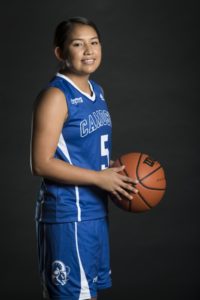Two Camosun alumni are really taking to heart the meaning of paying it forward. After Jade Montgomery-Waardenburg and Ashley McGinnis graduated from Camosun’s Early Childhood Education and Community, Family and Child Studies programs, respectively, and hung up their Camosun Chargers women’s basketball uniforms, they were sponsored by the Indigenous Sport, Physical Activity & Recreation Council (ISPARC), an organization that promotes active and healthy lifestyle choices for Indigenous people. Montgomery and McGinnis have been running basketball clinics in schools in rural BC towns; they are currently in Oliver.
“Well, Jade and I were two interior people who were able to run the clinic,” says McGinnis. “We were able to help out, and it is definitely beneficial to run the clinics. Now, we are just getting into coaching.”
Both Montgomery and McGinnis were new to coaching, and they took the training course for coaching together.
“I have wanted for a long time to give back to my community,” says Montgomery. “I know how important my coaches are to me, giving up their time and wanting the best for us, seeing potential in us, helping grow our confidence as Indigenous people, just trying new things. I really want to implement that sort of thing on other kids in my community. This camp was really important for that.”

The basketball clinics received very positive responses from the community.
“We just ended up going with it and it turned out to be really positive for the youth. They really ended up enjoying it,” says McGinnis. “I had a little girl come up to me and say, ‘I don’t really like basketball but I had so much fun!’ That was a really good time for us as coaches.”
One thing that both women are adamant about is the importance of learning how to play basketball for fun.
“There is such a wide variety of ages at these clinics, so we try to make it really fun and inviting, really inclusive,” says McGinnis.
Montgomery says that creating fun in sports is important.
“Less of that stigmatism of ‘winning is everything,’” she says. “In my course, we learned that 70 percent of kids age 13 drop out of sports because they are not having fun or there was too much pressure. I found that just crazy. It was really eye-opening, for sure. I really try to make it my goal to make some kids laugh, make some kids have fun.”
For the two Camosun grads, coaching basketball has been a way to promote a healthy lifestyle, to get to know more people, and to bring communities together.
“A lot of Indigenous kids grow up in trauma and hardships, and basketball—or, actually, all sports—have been a huge outlet for kids,” says Montgomery. “A lot of kids get their self-esteem, their self-confidence, from just getting out there. I think it is important for our nations to get together and meet each other, and make those connections—find those people that we can relate to.”
McGinnis says it can be hard for Indigenous students to go to clinics in the city, so it might help to see Indigenous people running the clinics.
“It’s more familiar for them to see someone like me and Jade running it,” she says. “It is just that commonality, you know?”
Montgomery and McGinnis found that basketball coaching brought positivity and promise to the communities that they played in, and also to each other.
“I think Ashley and I are like yin and yang when it comes to coaching,” says Montgomery. “She definitely steps up when it is the older kids; I do with the younger kids. We just bring that balance, you know, together, and with each other.”
